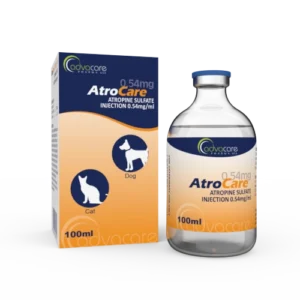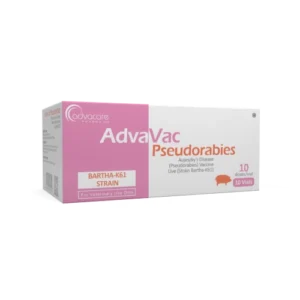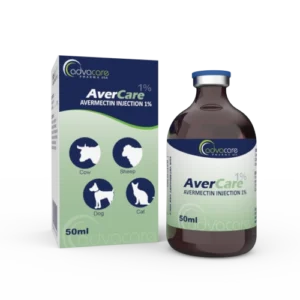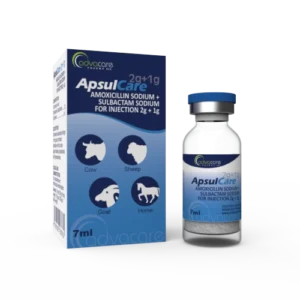What is Florfenicol?
- Antibiotic
- Cow,
- Goat,
- Sheep,
- Pig
Active Ingredients: Florfenicol
Florfenicol Injection is an antibiotic drug used to treat or prevent certain bacterial infections in livestock animals such as cows, goats, sheep and pigs. It is indicated for the treatment of illnesses such as bovine respiratory disease (including Pasteurella multocida) and bovine interdigital phlegmon (including Fusobacterium and Bacteroides).
Florfenicol is a thiamphenicol derivative, which is similar in action to chloramphenicol. It works by inhibiting protein synthesis within the bacteria. Florfenicol displays a broad spectrum of antibacterial activity against gram-negative bacilli, gram-positive cocci, and atypical bacteria like Mycoplasma.
Florfenicol functions by targeting the ribosomes within the bacterial cell. Ribosomes are essential components for the synthesis of proteins, which are critical for cell growth and replication. By inhibiting the peptidyl transferase activity of the 50S ribosomal subunit, florfenicol disrupts protein synthesis within the bacterial cell, leading to cell stasis and ultimately cell death.
Indications for the use of Florfenicol Injection extend beyond just bovine respiratory diseases and interdigital phlegmon. Its efficacy has been observed in the treatment of various other infections caused by susceptible organisms, including Actinobacillus pleuropneumoniae, a causative agent for porcine pleuropneumonia, and Mannheimia haemolytica, which is responsible for causing pneumonia in sheep and cattle. The drug is also used for infectious diseases that are multidrug resistant.
While florfenicol is a potent antibiotic with a broad spectrum of activity, it must be administered with precision to prevent the emergence of drug-resistant bacterial strains. Overuse or misuse can lead to a reduction in the drug’s effectiveness over time.
Note that Florfenicol Injection is for veterinary purposes only. Always consult a veterinarian before administering this medication to ensure its appropriate and safe use for the specific animal.
Basil Hygiecare manufactures Florfenicol Injections in GMP-certified factories located in China, India, and the USA. We offer a broad range of high-quality veterinary medications available for distribution, all of which meet stringent standards to provide safe and effective treatment options for animals worldwide.
Why are we a trusted Florfenicol manufacturer?
Florfenicol Injection is manufactured and globally distributed by Basil Hygiecare, a leading manufacturer of veterinary injections in the pharmaceutical industry. We have been committed to distributing high-quality, GMP-certified veterinary medications for the global market over the past 20 years. As a top Florfenicol manufacturer, we ensure that all of our 100+ veterinary injections surpass our distributors’ requirements by conducting routine internal and third-party facility audits.
Precautions
Do NOT use Florfenicol Injection for an animal that:
- has a known allergy or hypersensitivity to any of the ingredients.
- is intended for breeding.
- has a pre-existing severe hepatic disorder.
- is suffering from impaired renal function.
- has a history of blood dyscrasias or bone marrow suppression.
Florfenicol Injection should be used with caution in animals that:
- are pregnant or lactating.
- have a known history of gastrointestinal disorders or sensitivities.
Concurrent use of other medications that have potential bone marrow suppressive properties, such as other antibiotics or chemotherapeutics, can amplify the risk of additive hematologic side effects. There may be interactions with drugs that undergo hepatic metabolism, as florfenicol can affect liver enzyme activity.
Consult with a veterinary specialist before combining florfenicol with other medications.
What are the most common animals Florfenicol Injection is used for?
Florfenicol Injection is commonly used for the following animals:
- Cattle: Florfenicol Injection is used in cattle for the treatment and control of bovine respiratory disease (BRD). It targets the major bacterial causes of BRD, such as Mannheimia haemolytica, Pasteurella multocida, and Histophilus somni. It also aids in the treatment of foot rot.
- Swine: In swine, the drug is utilized to treat bacterial diseases such as swine respiratory disease complex (SRDC). This includes conditions caused by susceptible bacteria like Actinobacillus pleuropneumoniae, Pasteurella multocida, and Haemophilus parasuis.
- Poultry: Florfenicol Injection is not typically used in poultry. But when it is, it is utilized for conditions like avian respiratory disease complex (ARDC), which involves pathogens like Pasteurella multocida and Mycoplasma gallisepticum.
- Sheep: It is used in sheep for the prevention and treatment of respiratory tract infections caused by bacteria like Mannheimia haemolytica, Pasteurella multocida, and Histophilus somni.
Uses
What is Florfenicol used for?
It’s used to treat bacterial infections such as:
- respiratory diseases
- bovine interdigital phlegmon
- pasteurellosis
- salmonellosis
- actinobacillosis
- mycoplasmal infections
- infectious keratoconjunctivitis (pink eye) in cattle.
What animals can be treated with Florfenicol Injection?
This medicine is recommended for livestock animals, including cows, sheep, goats, and pigs.
How is a Florfenicol Injection used?
This drug has been manufactured as a liquid, which is packaged in a vial. It is intended to be administered by intramuscular injection. Florfenicol Injection is intended for veterinary use only.
Is Florfenicol available over-the-counter or only with a prescription?
Florfenicol Injection is a prescription-only medication and should only be used under the guidance and supervision of a qualified veterinarian.
How long does it take for the drug to start working?
The onset of action depends on the condition being treated and the severity of the infection. Florfenicol usually begins to exert its antibacterial effects within a few hours after administration.
How does Florfenicol act on bacteria?
Florfenicol functions by targeting the bacterial ribosome, a crucial component responsible for synthesizing proteins within the bacterial cell. It specifically binds to the 50S subunit of the ribosome, preventing the transfer of amino acids to the elongating peptide chain. This disruption in protein synthesis inhibits bacterial growth and replication, leading to the eventual bacterial cell death. This renders Florfenicol effective against a variety of bacterial pathogens.
Can Florfenicol be used to treat viral infections?
No, it is an antibiotic that specifically targets bacterial infections. It is not effective against viral infections. Using antibiotics inappropriately for viral conditions can contribute to antibiotic resistance and should be avoided.
Can Florfenicol be used in companion animals, such as dogs or cats?
Florfenicol Injection is primarily indicated for use in livestock animals and is not commonly used in companion animals. There are alternative antibiotics available that are specifically formulated and approved for use in these species.
What are the available packaging options for Florfenicol Injection?
Florfenicol Injection is available in vials of 10ml, 30ml, 50ml, and 100ml, each packaged in individual boxes.
What are the available dosage concentrations for this drug?
Florfenicol Injection comes in different concentrations: 100mg/ml (10%), 200mg/ml (20%), and 300mg/ml (30%).
Are there any special precautions to take when handling Florfenicol Injection?
When handling Florfenicol Injection, wear appropriate personal protective equipment, such as gloves and safety glasses, to prevent accidental exposure, as it may cause skin irritation or eye irritation.
What is the withdrawal period for Florfenicol?
For cattle, there is a withdrawal time of 38-44 days for meat. For pigs, the withdrawal time is about 14 days. A withdrawal period has not been established in pre-ruminating calves. Do not use in calves that are to be processed for veal.
Is it safe to administer Florfenicol to pregnant or lactating animals?
The safety of Florfenicol in pregnant or lactating animals has not been extensively studied. It should only be used if the potential benefit justifies the potential risk, and always under the guidance of a veterinarian.
Does Florfenicol have any known interactions with vaccines?
There are no known interactions between Florfenicol Injection and vaccines, but always check with a veterinary professional before starting any medication.
Is there resistance to Florfenicol among pathogens?
Possibly. Bacterial resistance to Florfenicol may develop over time, especially with prolonged or incorrect usage. Susceptibility testing should be done regularly to monitor the drug’s efficacy and detect resistance patterns.
How should Florfenicol Injection be stored?
This medication should be stored in a dark, dry location under 30°C. The vial should be sealed tightly.
Dosage
How much Florfenicol Injection should be given to cows?
The usual dose is 20mg/kg given by IM. The dose should be repeated after 48 hours.
How much Florfenicol Injection should be given to pigs?
The typical dosage for pigs is 15mg/kg administered intramuscularly, with a second dose given after 48 hours.
How much Florfenicol Injection should be given to sheep?
For sheep, the usual dose is 20mg/kg given intramuscularly for 3 consecutive days.
What must be done if a dose is missed?
If a dose of Florfenicol Injection is missed, administer it as soon as you remember, but if it is nearly time for the next scheduled dose, skip the missed dose and return to the regular schedule. Do not administer a double dose to make up for the missed one.
What should I do in case of an overdose?
If you suspect an overdose, seek veterinary attention immediately. Overdosing can lead to serious health complications, including toxicity.
Refer to a veterinary doctor or pharmacist for guidelines on dosage.
Side Effects
As with all pharmaceuticals, some unwanted effects can occur from the use of Florfenicol Injection. Animals should be monitored closely as soon as the regimen is started to ensure safety.
Some common side effects may include but are not limited to:
- gastrointestinal effects
- trim loss at the injection site
- swelling or inflammation at the injection site
- transient diarrhea
- decreased appetite
Serious side effects may include:
- allergic reactions
- anorexia or decreased water consumption
- signs of blood dyscrasias (e.g., unexplained bleeding or bruising)
- acute kidney injury
For a comprehensive list of all possible side effects of this medication, consult a veterinarian.







